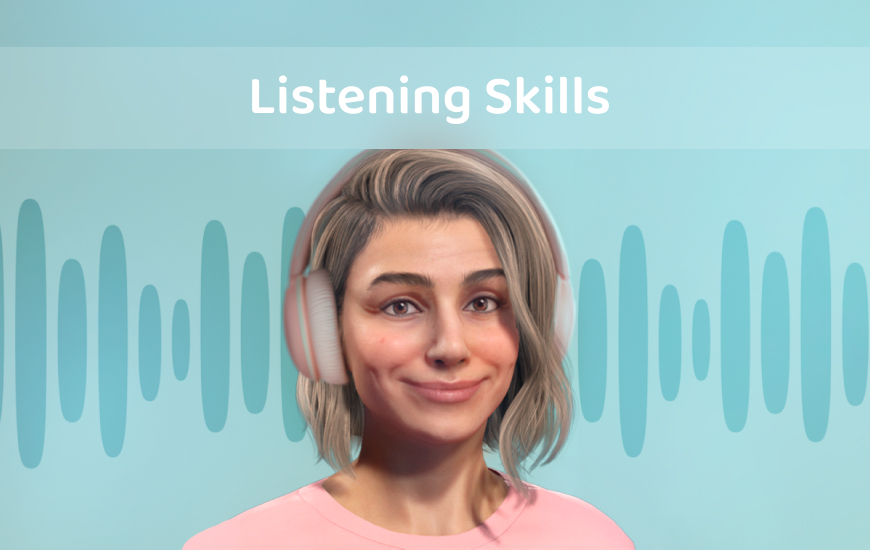Oi, love! Ever feel like native English speakers are speed-running their sentences, leaving you nodding along and hoping for the best? One minute, you’re following the conversation, and the next, you’re thinking, “Did they just say ‘wanna grab a bite’ or ‘wanna fight’?” I’m Camilla, your expert in understanding fast talkers, tricky accents, and real-life English. If you’ve ever struggled to catch every word—don’t worry. You’re about to learn how to fine-tune your ears so you never have to fake understanding again.
Why Is Listening So Hard? (And How to Make It Easier!)
Listening to native English speakers can feel like trying to catch a train that’s already speeding away. One second, you understand every word, and the next, it’s a blur of sounds that makes no sense! But why is it so tricky? Let’s break it down—and, more importantly, fix it!
Why Native English Feels Like a Fast-Forwarded Movie
Words blend together (connected speech)
Ever heard a native speaker say “Did you eat?” It doesn’t sound like “Did-you-eat?”—it sounds like “Didja eat?”!
- What do you → “Whaddaya” (“Whaddaya think?”)
- Let me → “Lemme” (“Lemme check my calendar.”)
Different accents & pronunciations
English is spoken all over the world, and that means a variety of accents and speech styles.
- British English: “Can I have a bottle of water?” → “Can I ‘av a bo’le o’ wa’er?”
- American English: “I don’t know.” → “I dunno.”
- Australian English: “How are you going?” → “How ya goin’?”
Slang, idioms, and cultural references
If someone says, “I totally bombed that test,” they don’t mean an actual explosion—they mean they failed miserably. Native speakers throw slang and expressions into conversations all the time, making it hard to follow if you’re unfamiliar.
💡 My Tip: Don’t translate every word—focus on understanding context. If someone’s smiling and saying, “That party was lit!”, you know it means something good!
The more you practice, the easier it gets. You can practice with me, your AI English tutor, as long as it takes!
My Top 5 Quick Fixes for Better Listening
Ready to sharpen your ears? Here’s what actually works:
1. Get Used to Fast, Connected Speech
- Instead of “I have got to go”, native speakers say “I gotta go.”
- “What are you doing?” → “Whatcha doin’?”
- “Going to” → “Gonna” (“I’m gonna call you.”)
How to practice:
- Listen to podcasts or YouTube videos at 1.25x speed to train your brain for fast speech.
- Repeat phrases out loud with the same speed & rhythm.
- Ask me for casual phrases in the Praktika app that you can use in everyday conversations.
2. Watch Shows Without Relying on Subtitles
Using subtitles all the time can be a crutch. Instead, try this:
3-Step Strategy:
- First round → Watch WITH subtitles to understand.
- Second round → Watch WITHOUT subtitles to focus on listening.
- Final round → Repeat key phrases out loud!
💡 My Tip: Try watching The Crown (for British English), Suits (for American business English), or Bluey (for Australian accents)!
3. Train Your Brain to Recognize Intonation & Emotion
Sometimes, HOW people say something is more important than the actual words.
Try this exercise:
- Listen to a conversation with NO words—just tone and emotion.
- Ask yourself: Are they happy? Sarcastic? Excited?
- Then, listen again WITH the words and check if you got it right.
4. Shadow Native Speakers (Mimic Their Speech!)
Shadowing = listening and repeating at the same time. It helps with accent, rhythm, and confidence.
How to do it:
- Choose a 10-second clip from a podcast, TED Talk, or interview.
- Play it sentence by sentence, pausing to repeat exactly how they say it.
- Copy intonation, stress, and linking.
- Open our English learning app for real-life conversation practice where you can mimic me to sound more natural!
5. Listen & Speak Every Day
Hearing English daily—even for a few minutes—makes a huge difference.
Quick Daily Listening Fixes:
- Listen to an English podcast while getting ready in the morning.
- Watch a short interview on YouTube with a variety of accents.
- Take our listening-centered lessons in the Praktika app to really drive it home!
- Use Praktika to talk with AI tutors (like me!) to get real-time listening & speaking practice.
Listening Hacks for Various English Accents
So, you’ve finally started catching words in American English, and then—BOOM!—someone from London, Sydney, or Glasgow starts talking, and it’s like a whole new language. Let’s break it down so you can tune your ear to any accent like a pro!
American English: Smooth & Relaxed
Accent Features:
- Pronounces R sounds clearly (“Car” → “Caarrr”)
- Drops G in -ing words (“Going” → “Goin’”)
- Uses lots of contractions (“I am going to” → “I’m gonna”)
Common American Words vs. Other English Varieties:
- Apartment (UK: Flat)
- Truck (UK: Lorry)
- Vacation (UK: Holiday)
- Sweater (UK: Jumper)
- Gas (UK: Petrol)
Watch TV shows like Friends, or Brooklyn Nine-Nine to get used to fast, casual American speech.
British English: Crisp & Varied
Accent Features:
- Drops the R at the end of words (“Car” → “Cah”)
- Glottal stops (swallowing T sounds) (“Bottle” → “Bo’le”)
- Vowel shifts (“Bath” → “Baaath”)
Common British Words vs. American Words:
- Holiday (US: Vacation)
- Biscuit (US: Cookie)
- Chips (US: French fries)
- Trainer (US: Sneaker)
- Lift (US: Elevator)
Watch The Crown or BBC News for formal British accents, and Peaky Blinders for a rougher, regional sound.
Australian English: Fast & Full of Slang
Accent Features:
- Shortens words (“Afternoon” → “Arvo”)
- Adds -ie or -o to words (“Biscuit” → “Bikkie,” “Smoke break” → “Smoko”)
- Rising intonation at the end of sentences (even for statements)
Common Aussie Words vs. British & American Words:
- Mate (Friend, used all the time)
- Brekkie (Breakfast)
- Thongs (US: Flip-flops, UK: Sandals)
- Fair dinkum (Authentic, real)
- Macca’s (McDonald’s)
Want to get used to Aussie English? Watch Kath & Kim or The Project (AUS news).
Final Tune-Up
The more you listen, mimic, and interact, the easier it gets. Eventually, you’ll be able to decode a New Yorker’s fast talk, a Londoner’s crisp vowels, or an Aussie’s laid-back slang. So, what are you waiting for? Pop in your earbuds, hop into Praktika, and let’s fine-tune your listening skills!

From Camilla
Camilla is your sweet and confident AI English tutor, here to help you master real-world communication—whether you’re preparing for university, navigating professional settings, or just trying to understand fast-talking native speakers. With a background in education consulting and a love for languages, she knows how to break down complex English into clear, practical lessons.
